Better Than Most is a regular feature of The Business of Giving examining the best places to work among social businesses and nonprofit organizations.
Denver: I was recently down in Washington, D.C. and had the opportunity to visit the offices of the United Nations Foundation over at 1750 Pennsylvania Avenue. We’ll start with their President and CEO, Kathy Calvin, who will tell us about their work. And then you will hear from members of their engaged and motivated staff on why they find the UN Foundation to be a very special place indeed.
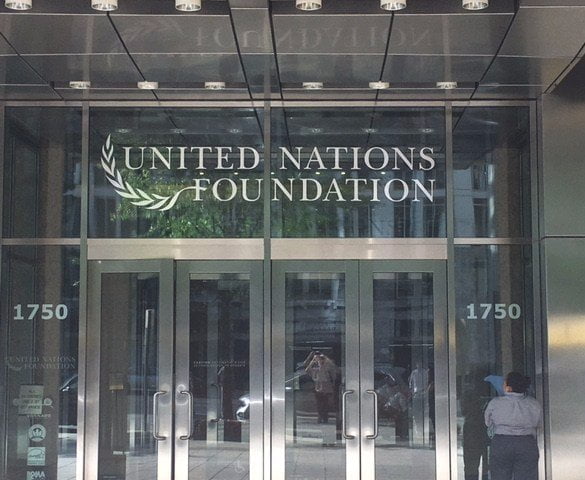
Kathy: The UN Foundation was founded by entrepreneur and businessman, Ted Turner, nearly 20 years ago because he felt he should put his money where his mouth was. And that was in supporting the UN and the work it does around the world to handle, challenge and fix some of the biggest problems. And in the 20 years that we’ve been in business, we’ve seen enormous progress in global poverty going down, hunger going down, children staying in school, but there’s lots more to do so we look forward to the next 20 years.
Annie: Kathy mentioned the quote that Ted Turner who founded our organization said, which is “Everyone can walk down the street and pick up a piece of paper.” And I think that idea of each employee and each person that we work with as being capable of doing smaller and large actions that are going to change the world is really emblematic both of the work that we do and of the work culture.
Emily: One of the previous deputy secretary generals at the UN said “No one can do everything, but everyone can do something.” And I think that is something that I take really true to my job day to day. And I think that the foundation feels like it’s a part of more broadly in supporting the UN.
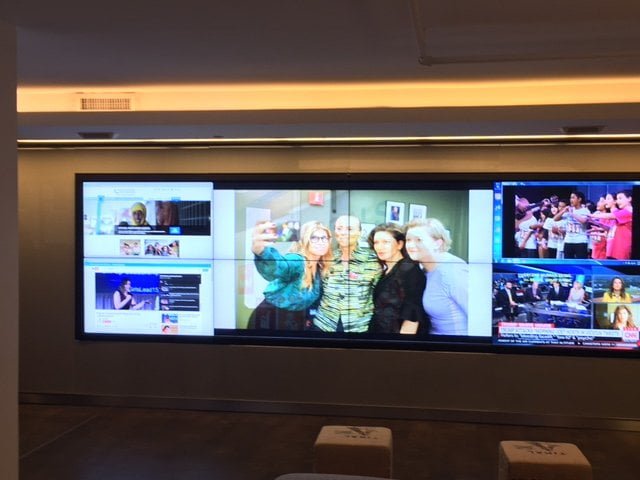 Seema: And really at UNF, the support I got is you can be successful at home and be successful at work, which I’m really grateful for. It set the path for the rest of my work here and it’s why people stay here. And they continue to grow their families if they wish. It’s why they continue to stay for almost a decade like Emily has or why people start as interns and continue to come back because it’s just that kind of place. And as somebody who works professionally on gender equality and sexual and reproductive health and rights, being able to work at an organization that really goes above and beyond to live those values is not an easy task. We know that. We know the US is not like in the front-runner of supporting these things and so, it just makes our work so much more clear in terms of why it is so important to make sure that everybody has that.
Seema: And really at UNF, the support I got is you can be successful at home and be successful at work, which I’m really grateful for. It set the path for the rest of my work here and it’s why people stay here. And they continue to grow their families if they wish. It’s why they continue to stay for almost a decade like Emily has or why people start as interns and continue to come back because it’s just that kind of place. And as somebody who works professionally on gender equality and sexual and reproductive health and rights, being able to work at an organization that really goes above and beyond to live those values is not an easy task. We know that. We know the US is not like in the front-runner of supporting these things and so, it just makes our work so much more clear in terms of why it is so important to make sure that everybody has that.
Emily: I’ve really appreciated the opportunity that that’s provided for a completely flat structure and opportunity for anyone to speak up and ask any questions, raise any issues, and feel like they won’t be judged for it. I think that’s important. And then also I’ve really appreciated that Kathy Calvin, our president CEO, has done office hours sometimes where anyone — doesn’t matter what you’re job — can sit down with her for 15 minutes and talk about anything. Again, it’s a safe space and I think some of those mechanisms the foundation has put in place have been helpful.
Wes: I think that there’s open floorplan that we’re really blessed with here in the DC office that really encourages us to not only work within our teams, but expand outside of it whether that’s working with additional campaigns like Shot at Life, Girl Up, Nothing But Nets, which our grassroots networks really appreciate because they want to diversify their own interest… Or mentoring our own interns and teaching them the ins and outs and how far they can really go to network and get to know different perspectives at the foundation; that’s really cool. But on top of that, I think that it gives us a chance to really coordinate with people who have such different perspectives and experience, whether that’s people who formerly work on campaigns and have a lot of a direct advocacy on the ground experience… Or whether that’s people who work on different forms of recruitment whether that’s donors or otherwise.
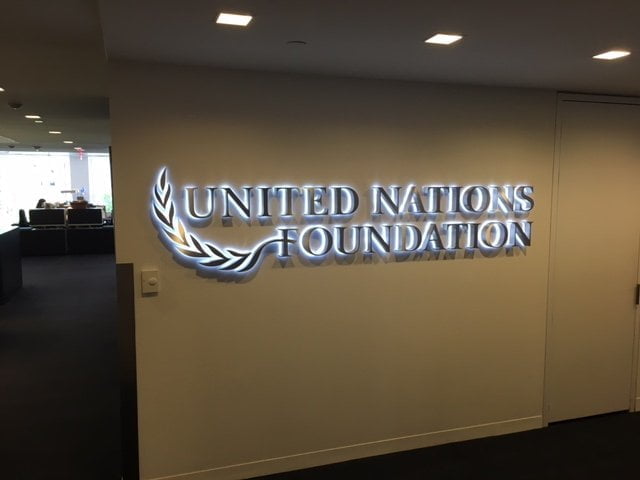 Annie: Sometimes I would do social media, so sometimes it’s just like: Okay, [this just feels] that I’ve been tweeting and Instagram posting a lot… like what does that do? And then all of the sudden the numbers start rolling in and 2000 journalists who’d been trained all over the world who now know how to talk about sustainable development goals. It’s 200 kids in Uganda who got to meet with a soccer star to learn about the sustainable goals and engage in sports and education.
Annie: Sometimes I would do social media, so sometimes it’s just like: Okay, [this just feels] that I’ve been tweeting and Instagram posting a lot… like what does that do? And then all of the sudden the numbers start rolling in and 2000 journalists who’d been trained all over the world who now know how to talk about sustainable development goals. It’s 200 kids in Uganda who got to meet with a soccer star to learn about the sustainable goals and engage in sports and education.
It’s people around the world who are given these tools able to transform their communities and who come to our events leaving inspired and say, “Oh I’m going to reforest Ireland.” And are now working to teach kids about ecology and plant trees. It’s just incredible and sometimes it does get kind of — we all work very hard day- to-day and whenever I have that moment to take a step back and be like “Wow!” There is definitely a huge wow factor here.
Kenny: Also, just going back to culture and the way we’re set up organizationally, one of the wow factors is that you’re encouraged to talk to people like the CEO and the COO. I remember within the first week of me being here, I was in the meeting with my boss and our COO and the CEO of the Global Alliance for Clean Cookstoves, they looked to me, and I wasn’t expecting to speak in this meeting… But they looked to me after being here for a week or so and we’re sitting there talking numbers and budgets and plans for the next year. At UNF, it is really encouraged. Our COO stops by my desk where he encourages everybody to just walk into the office and ask him a question if you want. It is not something you always see in other organizations. So I think that speaks volumes for the way our culture is set up at UNF.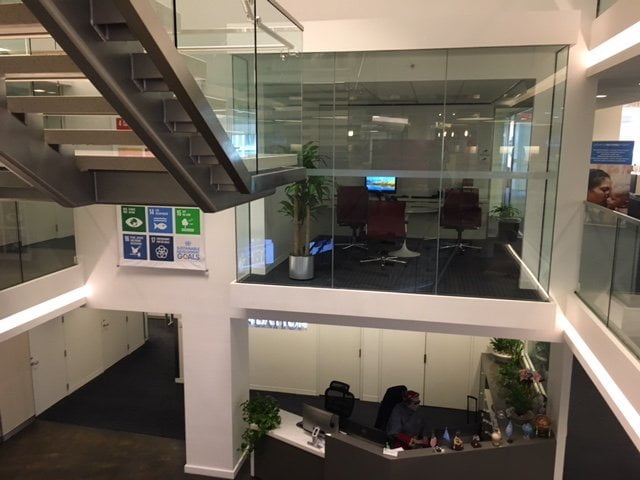
Tisha: There is such incredible talent here in this organization. But when we do pause and we are mindful of the impact that we’re making, I think it just actually recharges us to go out there and work even harder and stronger and be even more excited and more passionate. I look at all of us kind of like global ambassadors. It’s not just the pins that we wear. It really is the way that we talk about our work. There are many of us that go home saying, “Ugh, that place.” The only time I feel challenged or discouraged is when I haven’t figured out the solution. But actually what that motivates me to do is work with others to figure out the solution. Because at the end of the day, we get to get people like Steph Curry and Bill Gates talking about mosquitoes. I mean, if that’s not an example of being a global influencer, I don’t know what could be.
Kathy: But we want talent, we want energy, we want enthusiasm but we also like nice people. It’s not worth working with jerks and so we prioritize people who are good team workers, able to take initiative, care about the value proposition that we stand for in our mission and also are willing to stretch and grow because almost nobody comes here knowing a lot about the UN. And they will leave here knowing a lot about the UN but even more about the world.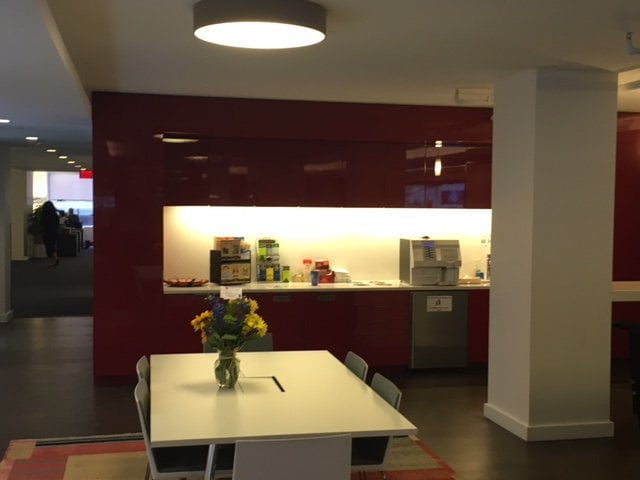
Seema: On a totally separate note, when I was thinking about what’s kind of really unique about UNF too on a day to day basis is when we moved from our old building to this building, one of the changes was that there were no microwaves on each floor, which I was very resistant to.
And the reason is they wanted to put all the microwaves and all the refrigerators on our top 12th floor so that it would force us all to go up there at the lunch hour to get our lunches, to warm it up or whatever. Again, I resisted and ate warm tuna sandwiches for quite some time but now that I do wanna bring my lunch and it’s a gift. It’s a gift that they made us go up to the 12th floor, enjoy the view… They’ve set it up so it’s very welcoming and that there’s not this expectation which being of a certain age too. There’s others’ expectation that you’re just at your desk all day which is sort of this old school expectation of corporate culture. You can work from anywhere as long as you’re getting your work done and that allows you to deal with everything you have to deal with in your life and still be productive at UNF. So, I now go to the 12th floor for my lunch.
Rocio: And if anything I was really surprised because I was expecting to go in there and them tell me like how I’ve been doing but in reality they wanted me to tell them how they can do a better job so I can improve on my job. So it was that critical feedback that I was like: I’ve never in that position where I’m telling you… Like this is how you can help me do my job. So I thought in those terms, it’s really awesome because it gives you agency of your job and it gives you that power to really do more than what you’re expected to do.
Denver: I want to thank Kathy Calvin for opening up the offices of the UN Foundation for all of us to visit and to the others who participated in this segment; Annie Rosenthal, Wes Rogerson, Kenny Pankey, Tisha Hyter, Emily Ross, Seema Jalan, and Rocio Ortega. Now, just go to denverfrederick.wordpress.com where you can hear this podcast again, read the transcript, and see pictures of the participants and the offices of the UN Foundation.
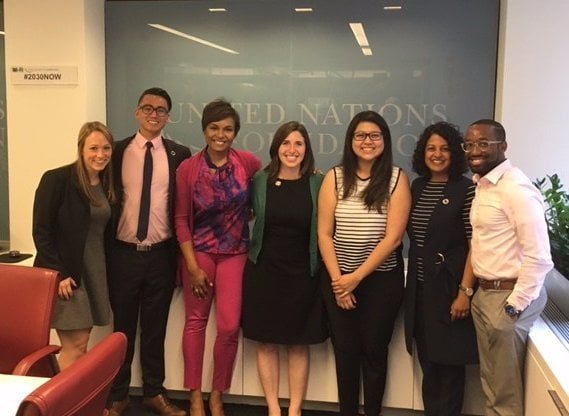
The Business of Giving can be heard every Sunday evening between 6:00 p.m. and 7:00 p.m. Eastern on AM 970 The Answer in New York and on iHeartRadio. You can follow us @bizofgive on Twitter, @bizofgive on Instagram and at http://www.facebook.com/BusinessOfGiving

